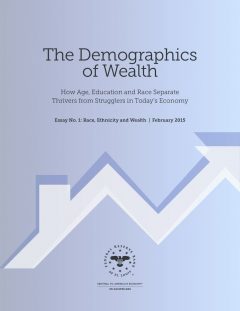A new economic reality line is emerging in the U.S. It’s between the thrivers, the one-quarter of the population who are accumulating wealth, and the strugglers, the other three-quarters who are not. As this research shows, race, education and age increasingly determine whether someone is a thriver or a struggler. This is the first in a series of essays that the Center for Household Financial Stability published on how a family’s race or ethnicity, educational attainment, and age are related to its financial choices and the financial outcomes it experiences. The primary data source is the Federal Reserve’s triennial Survey of Consumer Finances, which provides the most comprehensive picture of American families’ balance sheets and financial behavior over time.
The demographics of wealth are powerful, if not definitive. By documenting the relationships
that exist among race and ethnicity, educational attainment, and age on the one hand, and a host of financial behaviors and financial outcomes on the other, this research sets the table for action by individuals and by policymakers to improve the financial health of all American families and of the nation as a whole.
This research was shared at the 2015 AFN Grantmaker Conference, which included both regional and community-based funders and thought leaders concerned about a common goal – providing individuals, families and communities with greater economic security and opportunities for growth. View all 2015 Grantmaker Conference resources.
Resources Sponsors
The 2015 Grantmaker Conference was sponsored by the following: The Kresge Foundation, The Annie E. Casey Foundation, MetLife Foundation, Citi Foundation, JPMorgan Chase and Company, Thomas Family Foundation, W.K. Kellogg Foundation.


